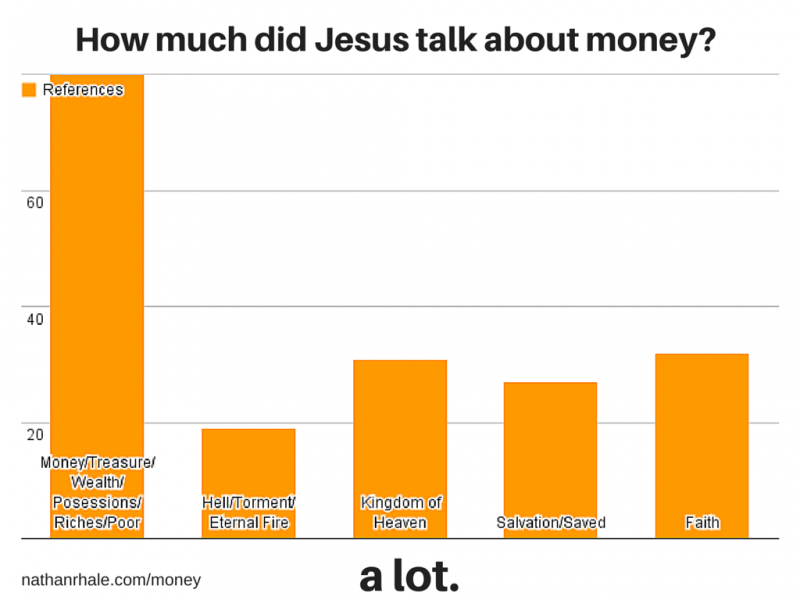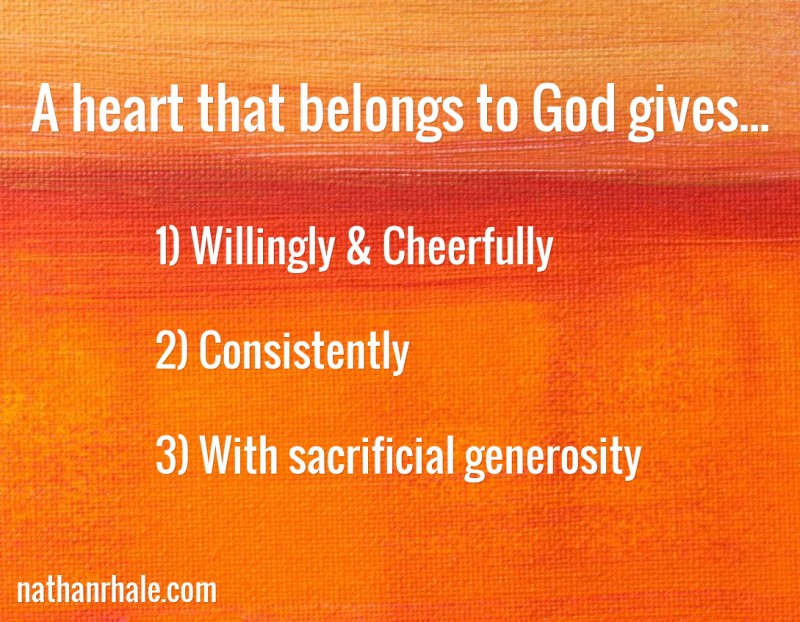If your heart belongs to God, so does everything else
When my wife Amber and I married each other, a lot changed for both of us in the days immediately after our marriage. For instance, we went from two separate bank accounts to one, joint bank account.
All of a sudden someone else could see everything I was spending my money on. I remember well the days before I got married, when I could buy video games and technological gadgets without really asking anyone for permission, just because I wanted to.
Those days are long, long gone.
Things changed because I became responsible for more than just myself.
Before we got married, I had a car and, Amber did not. After we were married, if someone asked Amber if she had a car, she’d say yes, of course I do. My things stopped being my things and became our things. In effect, my stuff became her stuff. And while it took some getting used to, I really didn’t mind. Why is that? Because the relationship was worth it.
Because on a summer day in 2005, I gave Amber my heart, and everything else followed from that.
Isn’t really the same with any deep relationship? We have these expressions that we reserve for our best friends and people we want to honor…”what’s mine is yours” “Mi casa es tu casa.”
If this is how we relate to other human beings, how much more should we give to God?
St. Mark shows us what it looks like in someone’s finances when they’ve given their whole heart to God.
The Widow's OfferingAnd he sat down opposite the treasury and watched the people putting money into the offering box. Many rich people put in large sums. And a poor widow came and put in two small copper coins, which make a penny. And he called his disciples to him and said to them, “Truly, I say to you, this poor widow has put in more than all those who are contributing to the offering box. For they all contributed out of their abundance, but she out of her poverty has put in everything she had, all she had to live on.”
(Mark 12:41-44 ESV)
When we give our heart to God–when we say “you are worth everything to me, it is you I am going follow, it is you that I’m going to find my identity in,” then doesn’t it make sense that everything will follow? Giving our life to God can mean nothing less than our time, our energy, our efforts, and yes, even our money. There is no reason our finances should be exempt from this. Our entire lives become our responsibility to steward toward the furtherance of God’s Kingdom.
A private affair?
We don’t like to talk about money in our culture. It’s considered to be a private affair. Here’s the thing though: Jesus wasn’t afraid to talk about money. Not at all. I made a chart to illustrate!

This graph is based on simple word searches from ESVBible.org.
I found about 80 passages that deal with money or use money as an illustration, which is significantly more than many other very important topics like hell, the Kingdom of Heaven, and faith.
Here’s just a sampling of what Jesus had to say about money, wealth, and treasure:
“You cannot serve God and money.” Matthew 6:24“The Pharisees, who were lovers of money…ridiculed him.” Luke 16:14
“For where your treasure is, there your heart will be also.” Matthew 6:21
“Take care, and be on your guard against all covetousness, for one’s life does not consist in the abundance of his possessions.” Luke 12:15
In contrast here are some of Jesus' thoughts on poverty:
“...when you give a feast, invite the poor, the crippled, the lame, the blind...” Luke 14:13“If you would be perfect, go, sell what you possess and give to the poor, and you will have treasure in heaven; and come, follow me.” Matthew 19:21
This one is truly staggering, evening paradigm-shifting:
“Blessed are you who are poor, for yours is the kingdom of God.” Luke 6:20
So the first thing we have to realize is that it’s okay to talk about money. Jesus did it! We’re meant to talk about it because the money’s not ours anyways. The second thing we have to realize just from this short survey is that Jesus’ attitude and approach to money is drastically different from our natural instinct.
Our culture privileges, idolizes, and empowers the wealthy. Possessions are status symbols because one’s status is determined by what one can afford. Jesus takes a different approach. For Jesus, everything belongs to God, and we are just managers.
Is that how you see yourself when it comes to your finances?
A matter of the heart
As you think about your life and how you approach your finances and what Jesus had to say…you have to ask yourself hard questions:
- How much of my heart am I really giving to God?
- Does my heart really belong to God?
- What is my treasure? Is it a thing, or things? Or is it Jesus?
That’s what is so beautiful about the passage from Mark. Jesus saw what the widow gave and had to comment because she went all-in. She gave everything she had to live on. And you know Jesus has gone all-in for you. Are you all in for him?
And the widow wasn’t giving for show! Everybody else was just throwing coins in, and enjoying the attention they would get as a result. But not the widow. No, the widow gave what she could, without any fanfare. But didn’t matter to Jesus how much she gave…it was the condition of the widow’s heart that mattered to Jesus.
That’s how it is with you and I too.
How much money should you give to your church?
It’s not a matter of whether or not you are giving a 10% “tithe”. Honestly, that would be the easy way out. You could think that if you’ve given your 10%, you’re good to go and the rest would be yours to do with as you please.
The whole 10% rule thing is a great place to start and a valuable part of the Old Testament economic system, but if we approach it as some sort of magic number or a strict rule that we just have to follow, we’re missing the point.
What did he tell the Rich Young Ruler who said he had been keeping the law faithfully his whole life? “Sell all that you have…”
Look, Jesus doesn’t demand 10% of your money. He asks for 100% of your heart and he wants whatever amount that you give to flow from that.
[bctt tweet=" Jesus doesn’t demand 10% of your money. He asks for 100% of your heart."]
The point isn’t whether or not you are giving 2%, 10%, or 50% to your local church. That’s not what Jesus is looking for. That’s not how a heart that belongs to God looks at it. It’s about whether or not 100% is being stewarded toward the Kingdom of God. This includes paying your rent and providing for your family and even enjoying life and gifts God has given you, but you’ve got to check your heart often to make sure you’re not hoarding or becoming selfish.
How to know you are giving from a heart that belongs to God
Here are 3 indicators that your giving coming from a heart belongs to God:
- It’s willing and cheerful. “God loves a cheerful giver” (2 Cor. 9:7).
- It’s a consistent pattern. The habit of giving is replete in both Old and New Testaments.
- It is sacrificially generous.

“Sacrificially generous” doesn’t necessarily mean that God is calling you to sell everything you own for a particular purpose right this second. I’m not saying it for sure means you shouldn’t buy a nice TV or new car. However…it might mean those things! You need to make sure you’re willing put others ahead of yourself. I mean, the widow gave everything she had to live on. Jesus gave everything he had to live on. Are you willing to follow Jesus in this?
If this sounds like a hard saying, good. This is hard. This kind of trust requires wisdom and faith and sacrifice.
But the relationship is worth it.
You make known to me the path of life; in your presence there is fullness of joy; at your right hand are pleasures forevermore. (Psalm 16:11 ESV)
Do you believe this today?
The impossible becomes reality
Giving God control in the area of finances will free you to build his Kingdom in ways you never even thought possible. God will accomplish amazing things in and through you that you might not even be able to imagine.
 Consider the example of John Wesley, the Anglican priest that started the Methodist movement in the 1700s. He made a good living (in fact he was quite wealthy) and spend most of it at first like most people…on things like entertainment and furnishings for his apartment. After an incident where he encountered someone in need but realized he had spent all of his money, things changed. One writer tells what happened:
Consider the example of John Wesley, the Anglican priest that started the Methodist movement in the 1700s. He made a good living (in fact he was quite wealthy) and spend most of it at first like most people…on things like entertainment and furnishings for his apartment. After an incident where he encountered someone in need but realized he had spent all of his money, things changed. One writer tells what happened:
Wesley began to limit his expenses so that he would have more money to give to the poor. He records that one year his income was 30 pounds and his living expenses 28 pounds, so he had 2 pounds to give away. The next year his income doubled, but he still managed to live on 28 pounds, so he had 32 pounds to give to the poor. In the third year, his income jumped to 90 pounds. Instead of letting his expenses rise with his income, he kept them to 28 pounds and gave away 62 pounds. In the fourth year, he received 120 pounds. As before, his expenses were 28 pounds, so his giving rose to 92 pounds.Wesley felt that the Christian should not merely tithe but give away all extra income once the family and creditors were taken care of. He believed that with increasing income, what should rise is not the Christian’s standard of living but the standard of giving.
John Wesley knew that if his heart belonged to God, so did everything else.
A sacred trust
We’ve all been given a sacred trust in relationships, opportunities, physical resources, and money. If you believe your life is not your work, but God’s work to build his Kingdom, you have to be cheerful, consistent, and sacrificially generous in how you steward your entire life.
Of course, there’s so much more to it than money. Your whole heart must belong to God.
And if your heart belongs to God, so does everything else.
 NRH
NRH